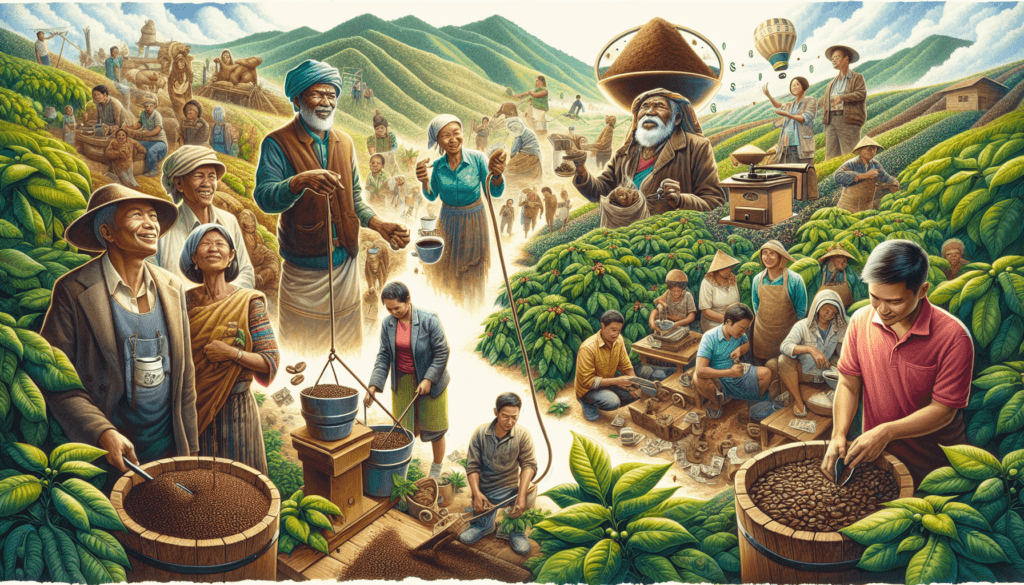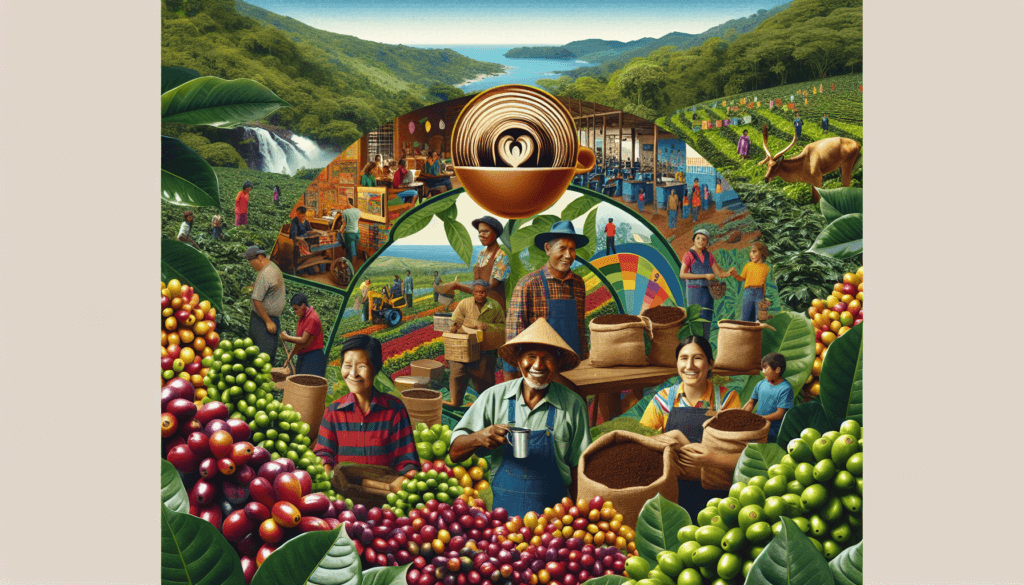In “The Ultimate Guide to Coffee Sourcing and Ethical Practices,” you will gain valuable insights into the world of coffee sourcing and the importance of ethical practices. Discover the intricate process behind finding the perfect coffee beans and how ethical considerations can impact the entire supply chain. From exploring sustainable farming practices to supporting fair trade initiatives, this guide will equip you with the knowledge to make informed choices when it comes to your daily cup of coffee. So grab your favorite brew, and let’s embark on a journey of discovery together.

Understanding Coffee Sourcing
Sourcing Regions
When it comes to coffee sourcing, it is important to understand the various regions around the world that produce coffee. Some of the major coffee sourcing regions include South America, Central America, Africa, and Asia. Each region has its own unique climate, soil conditions, and elevation, which contribute to the distinct flavors and characteristics of the coffee beans. By understanding the different sourcing regions, you can better appreciate and explore the wide range of flavors coffee has to offer.
Varieties of Coffee
Coffee comes in various varieties, and each variety has its own distinct flavors and qualities. Some of the popular coffee varieties include Arabica, Robusta, and Liberica. Arabica coffee is known for its delicate and nuanced flavors, while Robusta coffee has a stronger and more bitter taste. Liberica coffee, on the other hand, is less common but has a unique and intense flavor profile. By exploring the different varieties of coffee, you can discover your personal preferences and find the perfect cup of coffee for yourself.
Sourcing Challenges
Coffee sourcing is not without its challenges. Factors such as climate change, political instability, and economic fluctuations can greatly affect coffee production and sourcing. Additionally, issues like lack of infrastructure, limited access to education and resources, and fluctuating market prices can pose challenges to coffee farmers. Understanding these challenges is crucial in order to support coffee sourcing practices that are fair, sustainable, and ethical. By addressing these challenges, we can ensure the long-term viability of coffee sourcing and support the livelihoods of coffee farmers worldwide.
The Impact of Ethical Coffee Sourcing
Fair Trade Certification
Fair trade certification is an important aspect of ethical coffee sourcing. It ensures that coffee farmers are paid fair prices for their products and provides them with better working conditions and opportunities for development. By purchasing fair trade certified coffee, you are directly supporting the well-being and empowerment of coffee farmers and their communities. Fair trade certification also promotes environmental sustainability and encourages responsible farming practices.
Direct Trade Relationships
Direct trade relationships between coffee farmers and roasters are another key element of ethical coffee sourcing. These relationships provide farmers with more control over their pricing and enable them to receive higher premiums for their coffee. Direct trade also fosters transparency and accountability in the coffee supply chain, as well as strengthens the connection between the farmers and the end consumers. By choosing coffee from roasters that have direct trade relationships, you can ensure that your coffee is sourced ethically and sustainably.
Sustainable and Organic Sourcing
Sustainable and organic sourcing practices are essential for protecting the environment and preserving the long-term viability of coffee production. By implementing sustainable farming methods, coffee farmers can minimize the use of chemicals, reduce water consumption, and promote biodiversity. Organic sourcing, on the other hand, ensures that the coffee beans are grown without synthetic pesticides or fertilizers. By choosing coffee that is sourced sustainably and organically, you are supporting environmentally-friendly practices and promoting the health and well-being of both the farmers and the planet.
Certifications and Labels to Look For
Fair Trade Certified
When looking for ethically sourced coffee, one of the certifications to look for is Fair Trade Certified. This certification guarantees that the farmers have been paid fair prices for their coffee, allowing them to invest in their farms and communities. Fair Trade Certified coffee also ensures that workers are treated fairly, and that environmental sustainability and responsible farming practices are being followed.
Organic Certification
Another important certification to look for is Organic certification. This certification guarantees that the coffee beans have been grown without the use of synthetic pesticides or fertilizers. Organic coffee farming promotes the health of the soil, water, and wildlife, while also providing consumers with a natural and chemical-free option. By choosing Organic certified coffee, you are supporting environmentally-friendly practices and protecting your health.
Rainforest Alliance Certified
The Rainforest Alliance Certified label indicates that the coffee has been sourced from farms that meet strict social, economic, and environmental standards. This certification ensures that the coffee is grown in a way that protects biodiversity, conserves natural resources, and supports the well-being of farmers and their communities. Look for the Rainforest Alliance Certified label to ensure that your coffee has been sustainably sourced.
UTZ Certified
The UTZ Certified label guarantees that the coffee has been sourced from farms that follow sustainable agricultural practices, ensuring the well-being of workers, the environment, and the quality of the coffee. UTZ certification focuses on promoting responsible and transparent coffee sourcing, while also supporting farmers in improving their agricultural practices and increasing their productivity. Look for the UTZ Certified label to support sustainable coffee sourcing.
Bird-Friendly Certification
For coffee lovers who are passionate about environmental conservation and bird habitats, the Bird-Friendly Certification is one to look for. This certification ensures that the coffee has been grown in a way that maintains or restores bird habitats, promotes biodiversity, and avoids the use of harmful chemicals. Coffee farms with this certification provide a safe haven for migratory birds and contribute to conservation efforts. By choosing Bird-Friendly Certified coffee, you can support the preservation of bird populations and their habitats.
The Role of Coffee Farms and Farmers
Farm Size and Structure
Coffee farms come in different sizes and structures, ranging from small, family-owned farms to larger commercial operations. The size and structure of a coffee farm can have an impact on the sourcing practices and the livelihoods of the farmers. Smaller farms often focus on quality over quantity, using traditional farming methods and manual labor to produce specialty coffee. Larger farms, on the other hand, may prioritize efficiency and volume production. It is important to support coffee farms of all sizes and structures, as they each play a valuable role in the coffee industry.
Labor Practices
Labor practices at coffee farms can vary significantly. It is important to look for coffee sourcing practices that prioritize fair and ethical treatment of workers. This includes providing fair wages, safe working conditions, and opportunities for professional growth and development. Support coffee farms that have transparent labor practices and prioritize the well-being of their workers.
Educational and Support Programs
Many coffee farms and organizations offer educational and support programs to coffee farmers, helping them improve their farming techniques, increase their yields, and navigate market fluctuations. These programs provide farmers with the knowledge and tools they need to sustain their livelihoods and improve their quality of life. By supporting coffee farms that invest in educational and support programs, you are helping farmers thrive and contribute to a sustainable coffee industry.

Environmental Considerations
Deforestation
Deforestation is one of the major environmental challenges associated with coffee production. In some cases, coffee farming has led to the clearing of forests, resulting in habitat loss, soil erosion, and the loss of biodiversity. It is important to support coffee sourcing practices that prioritize reforestation, agroforestry, and the preservation of natural habitats. By choosing coffee that is sourced from farms committed to environmental conservation, you can contribute to the preservation of forests and wildlife.
Water Usage and Conservation
Coffee production requires significant amounts of water, and improper water management can lead to water scarcity and pollution. Sustainable coffee sourcing practices prioritize responsible water usage and conservation. This can include using water-efficient irrigation systems, implementing wastewater treatment procedures, and promoting water conservation practices at the farm level. By supporting coffee farms that prioritize responsible water usage, you are helping to mitigate water scarcity and protect fragile ecosystems.
Biodiversity Preservation
Coffee farms can play a crucial role in preserving biodiversity, as they are often located in ecologically diverse regions. By implementing sustainable farming practices, such as agroforestry and the preservation of natural habitats, coffee farms can provide habitat for a wide range of plant and animal species. Biodiversity preservation not only supports the environment but also contributes to the long-term health and sustainability of coffee production. Look for coffee sourced from farms that prioritize biodiversity preservation to support these important conservation efforts.
Building Sustainable Supply Chains
Chain of Custody
A sustainable supply chain starts with a strong chain of custody. This refers to the process of tracking the journey of the coffee beans from the farm to the roaster to the retailer. By implementing proper chain of custody practices, coffee companies can ensure the traceability and transparency of their products, while also minimizing the risk of contamination and fraud. Look for coffee roasters and retailers that prioritize a robust chain of custody to support sustainable sourcing practices.
Traceability
Traceability is a crucial aspect of ensuring the transparency and accountability of coffee sourcing. It involves identifying and tracking the origin of the coffee beans, as well as documenting the various stages of its production, processing, and distribution. Coffee companies that prioritize traceability can provide consumers with detailed information about the farmers, farming practices, and certifications associated with the coffee they offer. Look for coffee with traceable sourcing information to support transparent and responsible supply chains.
Transparency and Reporting
Transparency and reporting are essential for holding coffee companies accountable for their sourcing practices. Coffee companies that prioritize ethical sourcing are often transparent about their partnerships, certifications, and sustainability initiatives. They also provide regular reports and updates on their progress towards their sustainable sourcing goals. By supporting coffee companies that are transparent and committed to reporting, you are contributing to a culture of accountability and driving positive change in the coffee industry.

Evaluating Coffee Roasters and Retailers
Commitment to Ethical Sourcing
When evaluating coffee roasters and retailers, it is important to consider their commitment to ethical sourcing practices. Look for companies that prioritize fair trade, direct trade, and sustainable sourcing. They should also have clear policies in place to ensure the fair treatment of farmers and workers, as well as the protection of the environment. By supporting coffee roasters and retailers that are committed to ethical sourcing, you are making a conscious choice to promote responsible practices within the industry.
Relationships with Farmers and Cooperatives
Coffee roasters and retailers that prioritize ethical sourcing often foster strong relationships with the farmers and cooperatives they work with. These relationships are built on trust, collaboration, and mutual benefits. By maintaining direct trade relationships, coffee companies can ensure that farmers receive fair prices for their products, while also providing them with the support and resources they need to grow and thrive. Look for coffee companies that prioritize long-term relationships with farmers and cooperatives to support a sustainable and equitable supply chain.
Transparency in Supply Chain
Transparency in the supply chain is a key factor in evaluating coffee roasters and retailers. Look for companies that provide detailed information about their sourcing practices, certifications, and initiatives. Transparent companies willingly share information about the farmers they work with, their farming practices, and the social and environmental impacts of their operations. By choosing coffee companies that prioritize transparency, you can make informed decisions and support responsible sourcing practices.
Ethical Practices at Cafés and Coffee Houses
Employee Treatment
Ethical practices at cafés and coffee houses extend beyond sourcing and include how employees are treated. Look for establishments that prioritize fair wages, provide safe and inclusive work environments, and offer opportunities for professional growth and development. By supporting cafés and coffee houses that value their employees, you are contributing to a more equitable and ethical coffee industry.
Sustainable Packaging and Waste Management
Sustainable packaging and waste management are important considerations when evaluating cafés and coffee houses. Look for establishments that prioritize environmentally-friendly packaging materials, such as biodegradable or compostable options. Additionally, cafés that implement efficient waste management practices, such as recycling and composting, demonstrate a commitment to reducing their environmental footprint. Support cafés and coffee houses that prioritize sustainable packaging and waste management to contribute to a greener, more sustainable future.
Supporting Local Communities
Many cafés and coffee houses go beyond sourcing ethically by supporting local communities. They may partner with local organizations, schools, or farmers’ markets, or participate in community initiatives. By supporting establishments that actively engage with and contribute to their local communities, you are helping to create a positive and inclusive coffee culture.

Consumer Awareness and Responsible Choices
Reading Labels and Certifications
Consumer awareness is key to making responsible choices when it comes to coffee sourcing. Take the time to read labels and certifications to understand the origin of the coffee, the farming practices involved, and the social and environmental impacts associated with its production. Labels and certifications can help guide you in making informed decisions and supporting sustainable and ethical coffee sourcing.
Ethical Brand Research
In addition to reading labels and certifications, conducting ethical brand research can further enhance your understanding of coffee sourcing. Take the time to explore the sourcing practices, certifications, and initiatives of different coffee brands. Look for companies that prioritize fair trade, direct trade, and sustainability, and seek out reputable sources and reviews to ensure the accuracy of the information you find. By conducting ethical brand research, you can make more informed choices and support brands that align with your values.
Supporting Sustainable Brands
Supporting sustainable brands is one of the most impactful ways to promote ethical coffee sourcing. Look for coffee brands that prioritize fair trade, direct trade, organic sourcing, and environmental conservation. These brands often invest in the well-being of farmers, support their communities, and implement sustainable farming practices. By choosing sustainable brands, you are contributing to a more ethical and sustainable coffee industry.
The Future of Ethical Coffee Sourcing
Emerging Technologies and Innovations
The future of ethical coffee sourcing is filled with emerging technologies and innovations. From precision agriculture and blockchain technology to advanced processing techniques and climate-smart practices, these innovations can help improve sustainability, traceability, and working conditions within the coffee industry. By embracing and supporting these emerging technologies and innovations, the coffee industry can continue its journey towards a more ethical and sustainable future.
Collaborative Initiatives
Collaborative initiatives are playing an increasingly important role in promoting ethical coffee sourcing. Organizations, governments, and industry stakeholders are coming together to address common challenges, share best practices, and drive positive change. Collaborative initiatives can lead to the development of standards, certifications, and policies that support fair trade, sustainable sourcing, and environmental conservation. By supporting and participating in collaborative initiatives, the coffee industry can create a collective impact and work towards a more ethical and sustainable future.
Awareness and Education
Awareness and education are key to driving change in the coffee industry. By raising awareness about the social and environmental impacts of coffee sourcing, consumers can make more informed choices and demand ethical practices. Education initiatives can help coffee farmers improve their farming techniques, increase their yields, and navigate market fluctuations. By prioritizing awareness and education, the coffee industry can foster a culture of sustainability, responsibility, and shared values.
In conclusion, understanding coffee sourcing and its impact is essential for making responsible choices as a coffee consumer. By exploring coffee sourcing regions, coffee varieties, and the challenges faced in the industry, you can gain a deeper appreciation for the complexity of ethical coffee sourcing. Certifications and labels such as Fair Trade Certified, Organic Certification, Rainforest Alliance Certified, UTZ Certified, and Bird-Friendly Certification provide guidance when selecting ethically sourced coffee. Consider the role of coffee farms, labor practices, and educational programs in supporting ethical practices. Environmental considerations such as deforestation, water usage, and biodiversity preservation are crucial in promoting sustainability. Building sustainable supply chains that prioritize chain of custody, traceability, transparency, and reporting is key to supporting responsible sourcing practices. Evaluating coffee roasters and retailers based on their commitment to ethical sourcing, relationships with farmers and cooperatives, and transparency is important for making conscious choices. Ethical practices at cafés and coffee houses, including employee treatment, sustainable packaging, waste management, and supporting local communities, also contribute to an ethical coffee culture. By increasing consumer awareness through reading labels and certifications, conducting ethical brand research, and supporting sustainable brands, you can play a role in promoting responsible choices. The future of ethical coffee sourcing lies in emerging technologies and innovations, collaborative initiatives, and awareness and education. By embracing these advancements, the coffee industry can work towards a more ethical and sustainable future. Cheers to enjoying a cup of coffee that is not only delicious but also supports the well-being of farmers, protects the environment, and builds stronger communities.



